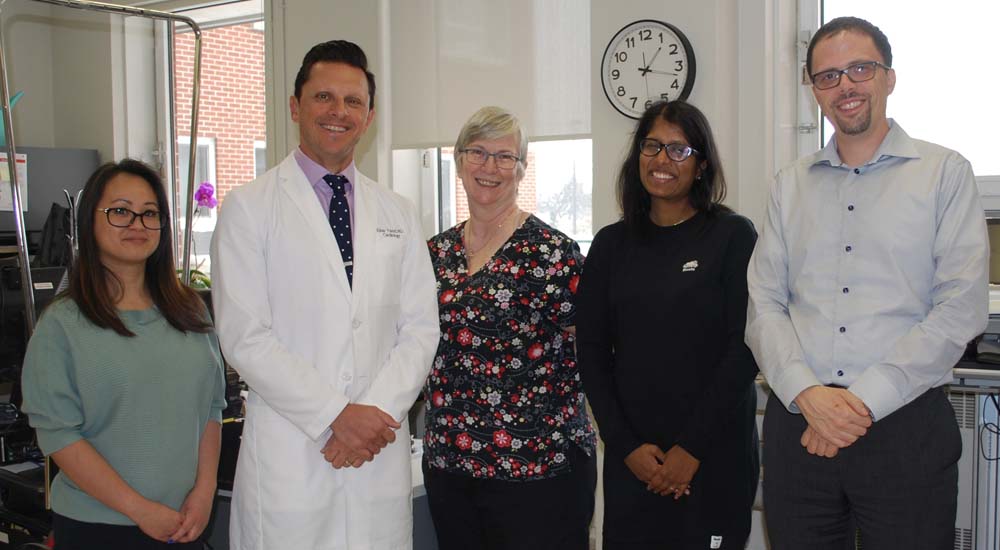Scarborough Health Network’s Cardio-Oncology clinic is marking a milestone after being internationally recognized and designated a Centre of Excellence by the International Cardio-Oncology Society (ICOS) – the only program in Canada to receive such a classification.
Leading the charge and sharing his insights is Dr. Kibar Yared, medical director of the Cardio-Oncology clinic and cardiac diagnostics at SHN. As medical director, Dr. Yared not only provides education to staff and cardiology residents, he holds an integral role in growing and shaping SHN’s Cardio-Oncology clinic, which helps cancer patients who have cardiac complications. He and his team of nurses, staff and other medical staff, have demonstrated outstanding contributions to the field, all the while continuously delivering exceptional, leading care to patients across Scarborough and Central East Ontario.
Receiving a “silver” status, SHN was recognized in January 2022 for its “exceptionally high concentration of expertise and related resources “¦ delivering associated care in a comprehensive, interdisciplinary fashion to afford the best patient outcomes possible.” As the Cardio-Oncology clinic continues to grow, including further educational activities and more improvement programs, SHN will be invited to re-apply for a gold status.
Here, Dr. Yared discusses the importance of this designation, what it means for patients, and the future for SHN’s Cardio-Oncology clinic.
Dr. Yared, why is this recognition so important for cardio-oncology and SHN’s Cardio-Oncology clinic overall?
Cardio-Oncology is a growing field with few clinicians around the world who are really well-versed in it. It continues to evolve and staying up to date is of utmost importance. As with any aspect of medicine, high quality work is crucial. Obtaining this certification proves that we have the necessary experience and expertise to support such complex patients.
I must thank our incredible nurses for the tremendous work they have put in to educating themselves and supporting our Cardio-Oncology patients. Some of these cases are quite complex clinically, and require a solid knowledge base of both cardiology and oncology. Our nurses have been instrumental in making sure our patients are armed with the necessary information to take care of their bodies and minds while they navigate their cancer treatment. Our principal clerk, Mary Ann Quilang, is amazing at ensuring the timely scheduling of the dozens of referrals we receive on a weekly basis.
This is a global recognition; what does this mean for SHN being a leader in this field?
This is a tremendous accomplishment for a large community hospital. To be able to achieve this type of recognition puts us on par in the area of Cardio-Oncology with many large academic centres around the world, and furthers our commitment to transforming the patient experience through innovation, education, and research.
SHN’s Cardio-Oncology clinic would not have achieved this kind of success without the collective efforts of all the staff involved. I am truly grateful to them all.
Since this designation is based on patient volume and type, can you describe what cases are often seen?
We collaborate closely with our oncology department to help diagnose, treat, and support patients with cardiovascular disease while they are undergoing cancer therapy. We are also responsible for the surveillance of these patients to ensure that if cardiovascular disease or heart failure should develop during cancer therapy, the patients receive timely attention by a trained cardio-oncologist. Most often, we see patients who develop weakness of the heart muscle as a result of chemotherapy. Due to the close attention we pay to these patients and their timely testing, we are able to intervene and treat their heart failure in order to minimize the time they spend without potentially life-saving cancer therapy.
How is SHN pushing the envelope to help patients live a healthier lifestyle?
Our staff are highly trained to provide teaching and educational resources to all of the patients that come through the clinic. We firmly believe in the role of lifestyle modification (including proper dietary habits and regular cardiovascular exercise) in helping prevent cardiovascular disease. We have also partnered with SHN’s regional cardiovascular rehabilitation service, which is one of the premier programs in North America. They are well-versed in the management of Cardio-Oncology patients.
How has Cardio-Oncology grown, and how to do you see it continuing to evolve? (i.e.: education activities and improvement projects)
Cardio-Oncology as an entity has grown by leaps and bounds. We know so much more about the potential cardiotoxic effects of several cancer therapies. Having a dedicated clinic to help these patients is essential to them continuing cancer therapy, uninterrupted.
At SHN, we continue to pursue educational activities to help promote an ongoing learning environment. As the field evolves, patient flow through the clinic changes as we accommodate the latest scientific evidence. We also continually perform audits into patient wait times, patient experiences, and our clinical outcomes in order to further improve on the care we deliver.

